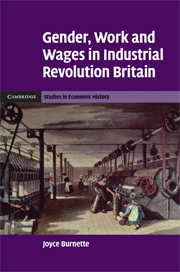Book contents
- Frontmatter
- Contents
- List of figures
- List of tables
- Preface
- Introduction
- 1 Women's occupations
- 2 Women's wages
- 3 Explaining occupational sorting
- 4 Testing for occupational barriers in agriculture
- 5 Barriers to women's employment
- 6 Occupational barriers in self-employment
- 7 Women's labor force participation
- 8 Conclusion
- Appendix to Chapter 3
- Appendix to Chapter 4
- Bibliography
- Index
8 - Conclusion
Published online by Cambridge University Press: 07 August 2009
- Frontmatter
- Contents
- List of figures
- List of tables
- Preface
- Introduction
- 1 Women's occupations
- 2 Women's wages
- 3 Explaining occupational sorting
- 4 Testing for occupational barriers in agriculture
- 5 Barriers to women's employment
- 6 Occupational barriers in self-employment
- 7 Women's labor force participation
- 8 Conclusion
- Appendix to Chapter 3
- Appendix to Chapter 4
- Bibliography
- Index
Summary
Competition is the great, the only, the all-prevailing evil.
– a male tailor and unionist, 1834During the Industrial Revolution, women earned lower wages than men, and worked in different occupations. This book has analyzed the reasons for these differences. In competitive portions of the labor market, women were disadvantaged by their lesser strength, since strength was important in most jobs. Women's wages were on average lower than men's wages because women were on average less productive than men. Occupational segregation was not the cause of the wage gap, but a method of minimizing it. If men and women had worked in the same occupations, the wage gap would have been even larger. Occupational segregation minimized the wage gap by directing women to occupations where wages were least sensitive to strength. While individuals used gender ideology to interpret the wage differences they saw, that does not necessarily mean that gender ideology was the cause of those differences; people often create myths to explain things they do not understand, or to justify institutions that benefit them economically. In competitive portions of the labor market the gender division of labor was determined by comparative advantage. Women worked in jobs requiring less strength, except for a few exceptional women who were strong enough to do jobs such as hewing coal. Comparative advantage also directed women to child-care tasks, so women preferred work in cottage industry, which could more easily be combined with child care.
- Type
- Chapter
- Information
- Gender, Work and Wages in Industrial Revolution Britain , pp. 327 - 335Publisher: Cambridge University PressPrint publication year: 2008



